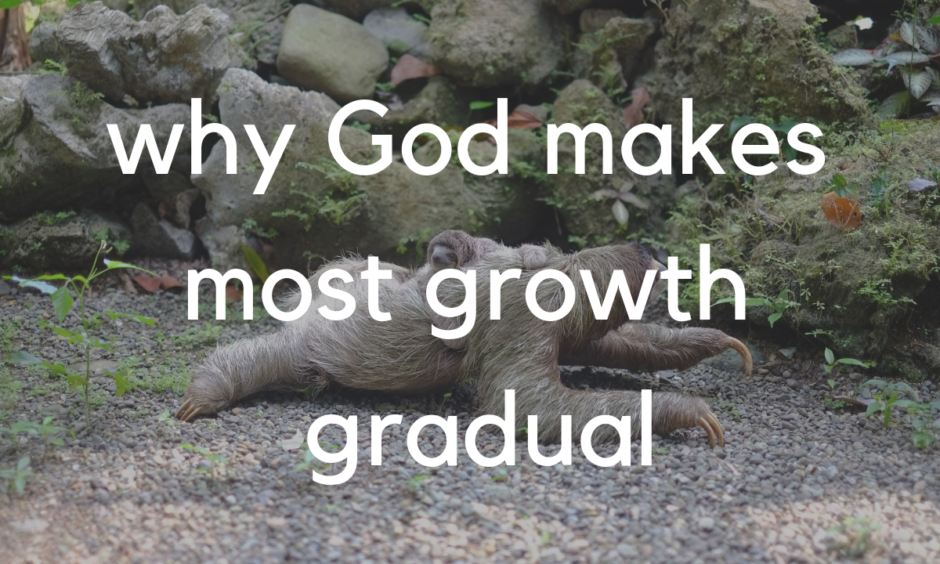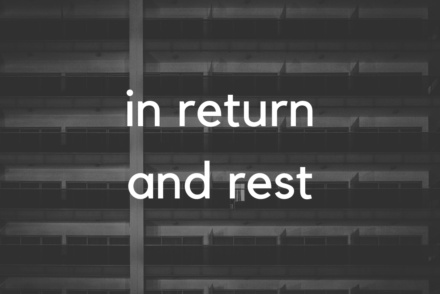Exodus 23:28-30
And I will send hornets before you, which shall drive out the Hivites, the Canaanites, and the Hittites from before you. I will not drive them out from before you in one year, lest the land become desolate and the wild beasts multiply against you. Little by little I will drive them out from before you, until you have increased and possess the land.
I will no longer drive out before them any of the nations that Joshua left when he died, in order to test Israel by them, whether they will take care to walk in the way of the Lord as their fathers did, or not.” So the Lord left those nations, not driving them out quickly, and he did not give them into the hand of Joshua.
Judges 2:21-23
Do you have anything in your life that you wish could just change instantly? Maybe you struggle with anxiety, or get angry easier than you know you should, or maybe you’re addicted to a substance or sex or social media or, well, anything. We humans are impressively inventive with our addictions.
Regardless of the source, when we have a problem we generally want an instant solution. More often than not we believe that if God was really working in and with us we would see near-instant overcoming in the areas where we struggle.
I want to propose that that is neither true nor good. The reality is that God makes most growth gradual. Here’s why.
Slow growth builds strength
In Exodus and Deuteronomy God tells the Israelites that he won’t drive the nations who opposed them out of the promised land all at once so that the land won’t become an overgrown wilderness. Instead, he will let the Israelites grow in numbers and strength as they remain faithful to him, taking the land he promised them bit by bit.
Slow growth allows us time to build strength and “fill out” into our newfound freedom. In the Gospel of Luke Jesus warns his followers that driving out a demon and leaving the space it filled empty simply invites more demonic forces back in. (Luke 11:24-25) When we get freedom from something we need time to fill it back in. God makes most growth gradual so that we can adjust to and allow the Holy Spirit to fill the spaces that are opened as we grow.
Slow growth builds faith
Contrary to popular opinion, miraculous restoration or growth generally doesn’t make a good foundation for lasting faith. The Israelite nation in Exodus and Deuteronomy are proof of this. God did miracle after miracle, from parting a sea to providing food for a nation in the desert, and the result was more faithlessness.
In contrast, slow growth and discovering God’s faithfulness in everyday life over the long haul does tend toward building faith. As we come to know God’s promises and put them to the test in day-to-day circumstances we discover a faith that can stand the test of time.
Slow growth proves faithfulness
Not only does slow growth build our own faith – it proves our faithfulness. It’s easy to ride the emotion-driven surge of “faith” for a few moments or months after something miraculous takes place, but the real proof of faith is in the long struggle and low times. It’s easy to kick your addiction when you’re feeling good, but the real proof of freedom comes when life is full of stress and the temptation to return to old coping mechanisms are powerful. That’s when our faithfulness is proven.
In Judges 2:21-23 God tells Israel that He is going to leave some of the Canaanite tribes in the promised land, “in order to test Israel by them, whether they will take care to walk in the way of the Lord as their fathers did, or not.”
The process of slow growth proves, generally more to ourselves than to God (He knows the future and all that), that we are faithful in abiding and bearing fruit.
Slow growth is growth that lasts. By all means, pray passionately for miraculous transformation! Invite God to do a powerful move in your life and change your circumstances or your heart. But don’t assume that because that doesn’t come you’re somehow getting shortchanged. It may well be the opposite. God has created us and knows what we need. He will be faithful and do what is good. And I’m convinced that, more often than not, what’s good for us is gradual growth.





No Comments